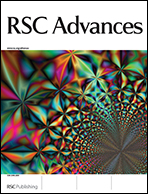Synthesis and high cycle performance of Zn–Al–In-hydrotalcite as anode materials for Ni–Zn secondary batteries†
Abstract
Zn–Al–In layered double hydroxides (LDHs) are synthesized by a hydrothermal method and investigated as anode materials for Ni–Zn secondary batteries for the first time. The Fourier transform infrared spectra (FT-IR), X-ray diffraction (XRD), scanning electron microscopy (SEM) and transmission electron microscopy (TEM) show that the as-prepared samples are well-crystallized and of plate-like morphology. Electrochemical tests indicated that the Zn–Al–In-LDHs, compared with Zn–Al-LDHs, exhibited higher discharge capacity, good cycle stability and long cycle life. This battery can undergo at least 800 charge–discharge cycles at constant current of 1 C without dendrite and short circuits. The discharge capacity of Zn–Al–In-LDHs after the 800th cycle remains about 380 mA h g−1.


 Please wait while we load your content...
Please wait while we load your content...